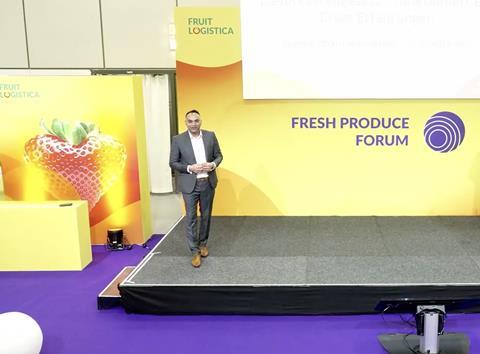The opening Fresh Produce Forum session of day two saw Hannes Langhorst and Vishal Gajjar outline how Lidl had taken steps to ensure plantation workers earned a living wage

Representatives from German discounter Lidl were on hand to deliver a presentation on the banana supply chain during day two of Fruit Logistica in Berlin.
The retailer’s focus on sustainability in the segment was the central theme of the session, held on the Fresh Produce Forum stage.
Sustainability for people and the planet, particularly Fairtrade, was an area close to Lidl’s heart, said Hannes Langhorst, vice-president purchasing international at Lidl International.
“We’ve been committed to the Fairtrade path for quite some time,” he told delegates. “We have a selection of Fairtrade bananas in our product portfolio, but we wanted a stronger focus on Fairtrade in general and we were wondering how to do that.
”We saw that along the supply chains there was a wage gap, for the people working on the plantations who ensure that we get our bananas day in, day out. They didn’t get enough pay, and filling the pay gap was not so easy.
”We’re really trying to support the farmers and all the employees working on the plantations,” Langhorst continued. ”This was a long path that took us two or three years, but now we’ve come up with a reliable and stable strategy.”
He noted how Lidl’s suppliers initially needed some convincing to take that path, but confirmed that they had offered lots of support in formulating the strategy.
Impact assessment
Vishal Gajjar, director supply chain systems, supply chain transparency and customer management at Lidl, said that the retailer initially carried out an impact assessment of the banana business to understand the problems within.
One of the key findings was a lack of living wages across the supply chain, he confirmed, which resulted in Lidl committing itself to the goal of only offering bananas in Germany produced by those earning a living wage.
This was not a simple task, he said, with many challenges, including the complicated nature of how workers were paid on the plantations.
”For example, the suppliers pay the premium to the exporter, which is then paid out to the plantation owner and workers in the fields,” Gajjar explained. ”But it doesn’t work that way because the exporter doesn’t know how much to pay the plantation owner, and in turn he doesn’t know how much to pay the workers.
”Who is getting this money? Well the wage gap differs based on different categories of workers, country to country, region to region and the varying levels of workers on the plantations.
”People were asking how it was going to work,” he said. “You have to set in place a mechanism that allows each plantation owner to pay out the premium to the individual workers based on level and workload. Actors in the supply chain do not know how these things work, so we had to organise this.”
Creating a tool
Gajjar said it was crucial to visit the plantations themselves, talking to owners and workers first-hand to determine what a living wage would actually be.
On returning, Lidl collaborated with IDH to create a tool for suppliers and plantation owners that identified a share of the premium that plantations, and in turn their workers, were entitled to.
As a result, workers were now paid in food vouchers and cash bonuses to increase their earnings to a living wage.
”We managed to bring about a fundamental change,” he added. “Just imagine, you get a food voucher that ensures you have to pay €200 less every month on food. Isn’t that great? This increases your net income and ensures a higher living standard.”
He finished by urging visitors to embrace sustainability.
”Let me encourage all of you to take action and embark on this path towards sustainability, no matter how difficult it seems to be in the beginning,” Gajjar added. “You will be able to reap the fruits.”



